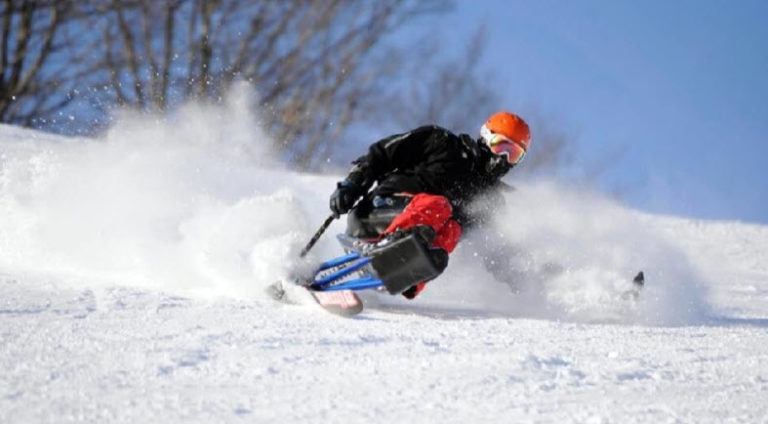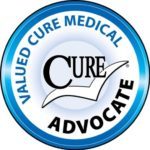 In August 2008, 21-year-old CURE ADVOCATE CHRIS COLLIN was flying down a back road on his motorcycle near his home in Hollis, Maine, going 100 mph. Like many young people, he believed the lie, “I’m invincible.” But he discovered he wasn’t, and his life was radically changed in less than five heartbeats. Here’s how Chris rebounded after SCI.
In August 2008, 21-year-old CURE ADVOCATE CHRIS COLLIN was flying down a back road on his motorcycle near his home in Hollis, Maine, going 100 mph. Like many young people, he believed the lie, “I’m invincible.” But he discovered he wasn’t, and his life was radically changed in less than five heartbeats. Here’s how Chris rebounded after SCI.
I knew I was going too fast on my motorcycle. When I came around a curve, I spotted a vehicle pulling out of a driveway onto the road. Instantly, I hit the brakes.
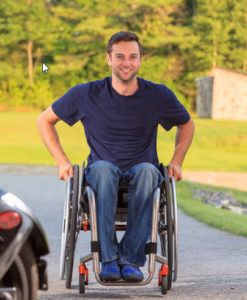
My motorcycle started skidding, and I lost control. I’d applied the brakes so hard, my chest went down and hit the motorcycle. As I went flying over the handlebars, I saw a concrete post with a steel bar in the center of it that my motorcycle soon sheared off.
I bounced over the post, went flying through the air and landed on my back in a group of trees.
If I’d only hit one tree, I probably would have been dead. However, the multiple small trees I hit absorbed some of the force of my body, reducing their impact on my body.
CHRIS WAKES UP TO A NEW REALITY
I don’t know how long I was unconscious. The paramedics arrived. Although I was in a lot of pain, the paramedics bombarded me with questions that I tried to answer. They put me in an ambulance and took me to Southern Maine Health Care (SMHC) near Biddeford.
The doctors put me into a medically induced coma for 3 weeks.
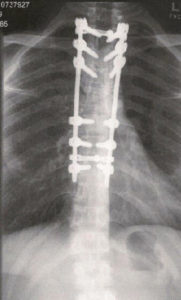
Hitting my bike’s handlebars broke four ribs, my sternum and my back in four different places. Those broken ribs punctured both of my lungs, collapsing them, which required chest tubes on both sides of my body. The doctors wanted to delay surgery on my back until my lungs healed, and I could breathe on my own. I was totally messed up and in great pain.
Trying to come out of that coma was the most difficult thing ever. The drugs caused me to hallucinate, erased much of my memory and made me feel foggy for several months.
The doctors told me I’d probably never walk again. Due to my still feeling the effects of the drug, I assumed that what the doctors said was a bad dream. Once I finally realized I wouldn’t walk again, that reality was tough for me to handle.
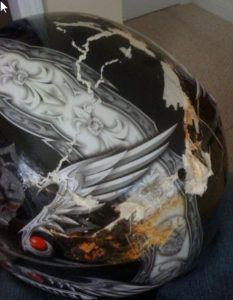
I didn’t sleep much, because I was so worried about what my life would be like. I hated my body was hooked up to so many machines that I couldn’t get comfortable. I was in serious pain.
The mental part of being paralyzed didn’t hit me until I tried to do the things I’d always done and couldn’t. I had to learn how to do things in a different way and realized I’d have to spend twice the time doing everything.
While I was in the coma, my parents educated themselves on what to do next, and where I should go for my rehabilitation.
My parents were relentless and talked to other patients, doctors and nurses to determine the best rehab center for me.
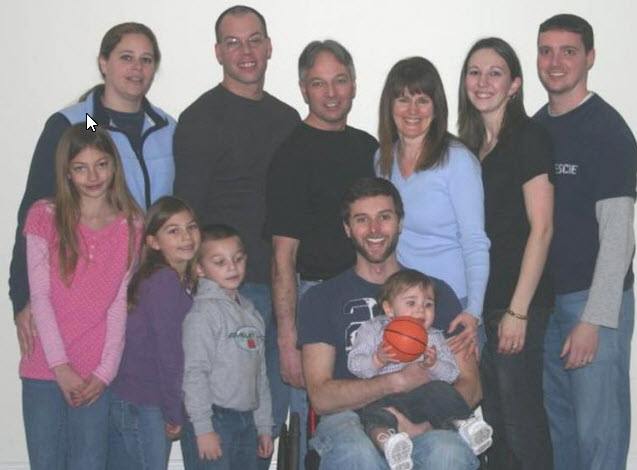
A representative from the Shepherd Center in Atlanta, Georgia, visited with me, showed me a video of the facility and answered my questions. I realized the Shepherd Center was the best place for me to rehab.
Rehabbing at the Shepherd Center
I stayed in the hospital in Maine for 2 months, having several surgeries and waiting for a spot to open at the Shepherd Center. One of my parents was with me every day.
Since I only had visited Florida in the Deep South, I thought traveling to Atlanta would be like visiting another country. However, after my Shepherd Center stay, I realized how amazing the facility and the people there were. They had a deep understanding of what I needed and how I needed to be rehabbed. At the Shepherd Center, I constantly learned more about how to do things I never thought I could do.
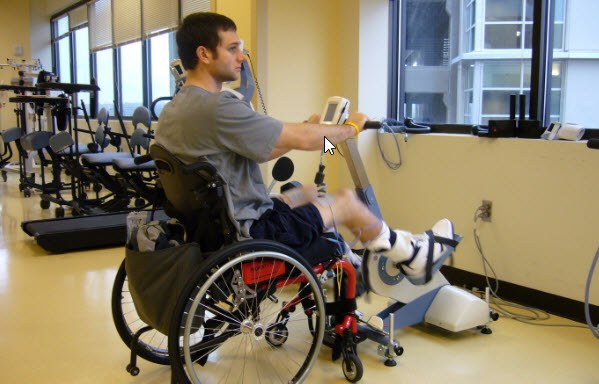
For the first time, someone presented me with options.
First, I was taught how to dress myself and perform all the different tasks I needed for every day living. One month there was inpatient therapy, and the second month was outpatient therapy.
The Shepherd Center offered about 100 different wheelchair-accessible apartments connected to the hospital, and my family and I stayed there. I had a call button there I could press, and a nurse would come to the apartment and help me.
The folks at the Shepherd Center taught me how to live independently.
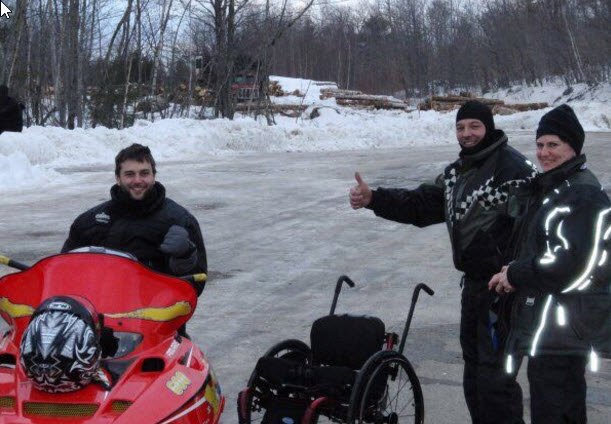
Chris Discovers Adaptive Skiing
One interesting part of my rehab was that I was given the opportunity to participate in many sports and learn about them. The Shepherd Center had information about facilities all over the country where I could participate in various sports, including skiing in Maine for people with disabilities.
Today that program is called Maine Adaptive Sports and Recreation. I got involved with that organization and did more outpatient therapy at a local hospital near my home.
Luckily, my physical therapist volunteered with Maine Adaptive Sports and Recreation, and she encouraged me to hook up with this organization.
Once my doctor cleared me, I learned how to snow ski, something I’d never done.
I used adaptive ski equipment, and someone guided me down a hill. After 2 or 3 years of going to the slopes and skiing three to five times a year, I got my own equipment – a monoski used for alpine skiing or sit skiing.
Today I sit on that one ski and use two poles like other skiers to maintain balance and to turn. However, my poles have full skis on the ends of them.
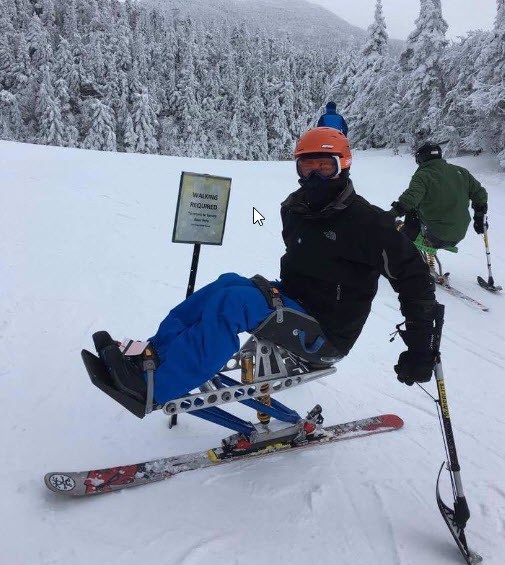
I’ve learned and improved so much that today I ski down double black diamond slopes.
More importantly, I’ve found a group of happy and fun people with injuries similar to mine. For the last two years, I’ve skied 35 to 40 days each year. Lots of people helped me get started. Then as I’ve felt more confident, I’ve taught other people with disabilities how to ski.
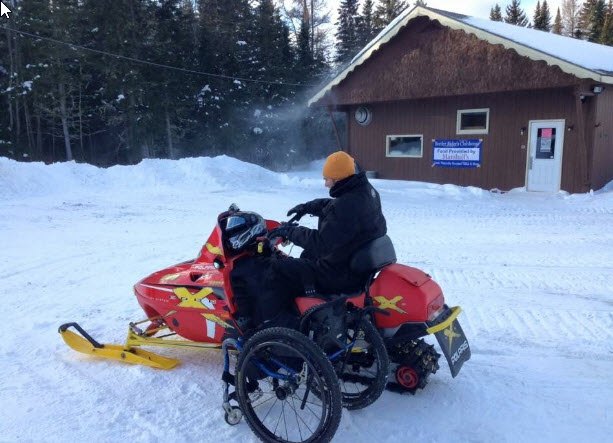
Enjoying Sports at Northeast Passage
I also volunteer with Northeast Passage – an adaptive sports program in New Hampshire that empowers individuals with disabilities to define, pursue and achieve their therapeutic recreation and adaptive sports’ goals.
When I learned about Northeast Passage and its rugby team, there was no team or coach for quadriplegics and not enough quadriplegics in the area to develop a team or to find other teams that the team could play.
But when I was at the Shepherd Center, I had watched a game and a video of quad rugby. Quad rugby looked like a lot of fun, since the person could ram his wheelchair into other players.
Northeast Passage allowed me to practice with its rugby team, which I truly enjoyed.
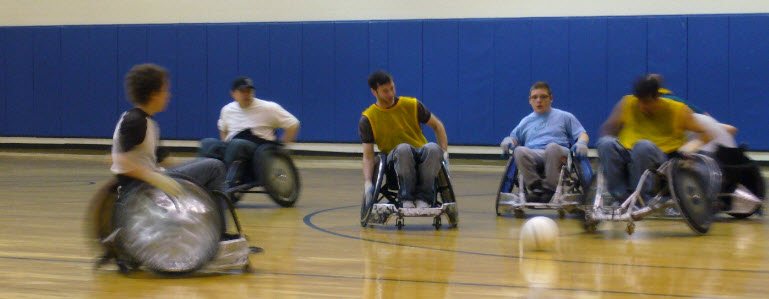
Unfortunately, before my accident, I never was into sports. My dad owned Collin and Sons Drywall Company. Every day after school I worked in my dad’s business. But after I became injured, instead of considering sports a recreational activity, I knew I had to be more active and keep my body as healthy as possible.
I also enrolled in college and now only lack 30 hours to obtain a business degree.
Working = Hunting + Fishing
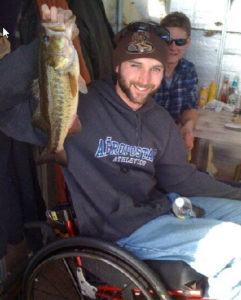
I work part-time at the Cabela’s store near my home in retail sales in the hunting department. I went into Cabela’s to buy a crossbow for hunting deer, and the employee helping me choose my crossbow said, “Hey, if you like to hunt and fish, we need some extra help. Why don’t you apply?”
When I told him I primarily deer hunted with a rifle, he said, “Why don’t you apply in the guns and ammunition section?” I’ve helped out in several different departments at the store. During deer season and in the summertime, I work 28 hours a week. The rest of the time I work about 20 hours a week.
In 2013, I took a moose, but mostly my hunting has been for deer. I’ve just started waterfowl hunting for ducks and geese. I fish more in the spring and summer, but even in the winter months, I go ice fishing.
My favorite fishing is taking striped bass, with my biggest a 34 inch striper. Luckily, I have a big group of friends who hunt and fish, and they take me with them anytime I want to go. I’m hooked on the outdoors!
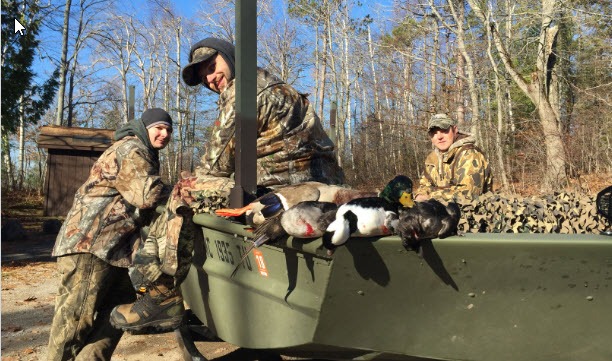
I’m often asked, “How do you get around in the woods and on the water?” I have a Renegade wheelchair – an off-road wheelchair I love.
When we go somewhere that the wheelchair can’t go, one of my buddies just throws me over his shoulder like a sack of potatoes and carries me. Sometimes two of my buddies have to help me.
They do whatever they have to for me to be with them – whether we’re hunting or fishing. They’re a real blessing!
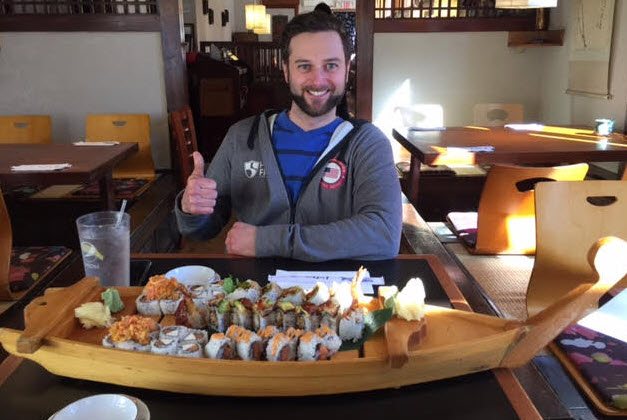
Why Chris Enjoys Being a Cure Medical Advocate
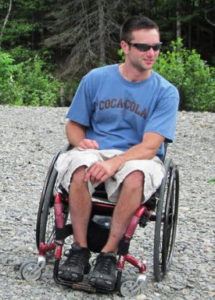
I’ve been asked to serve as one of the Cure Medical advocates and I’m honored to do so.
Right after my injury, I consistently got urinary tract infections (UTIs). I tried many different brands of catheters. I always washed my hands carefully before using my catheters and tried to keep everything associated with my catheters as sterile as possible.
However, I continued to get UTIs. My catheter provider, located in Portland, Maine, had been supplying my catheters and suggested I try one of the Cure Medical catheters that they carry. The Cure products worked really well.
To find the Cure Medical catheter that worked best for me, I tried a Cure Catheter Closed System, a catheter that came pre-attached to a bag. I never really touched the catheter. And after I began using the Cure Catheter Closed System, I seldom had UTIs.
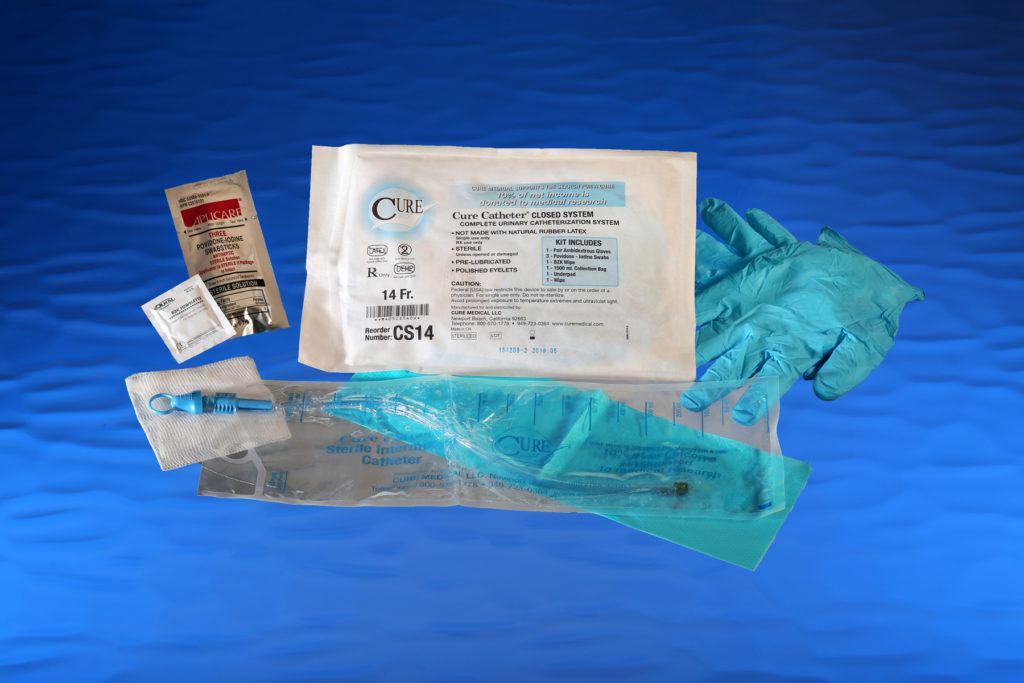
 To request free samples of the Cure Medical® Closed System or any Cure Medical® catheter, contact your local distributor of quality healthcare products, or click here.
To request free samples of the Cure Medical® Closed System or any Cure Medical® catheter, contact your local distributor of quality healthcare products, or click here.
I started off liking the Cure Medical catheter, because it reduced the number of UTIs I had. But then, after I learned more about them, I really appreciated that the Cure catheters didn’t contain any DEHP or BPA in their catheters. (Learn more about the concerns with DEHP here.)
In several studies, DEHP and BPA had been linked to cancer. I didn’t want to put anything with DEHP or BPA in my body.
As a Cure Medical advocate, I’ll be visiting with customers and friends in the Cure Medical booth at different events throughout the year like the Abilities Expo.
I’d love to talk with any person who wants to try out a Cure Medical catheter, and I’ll be happy to share my experiences. Feel free to reach out to me!
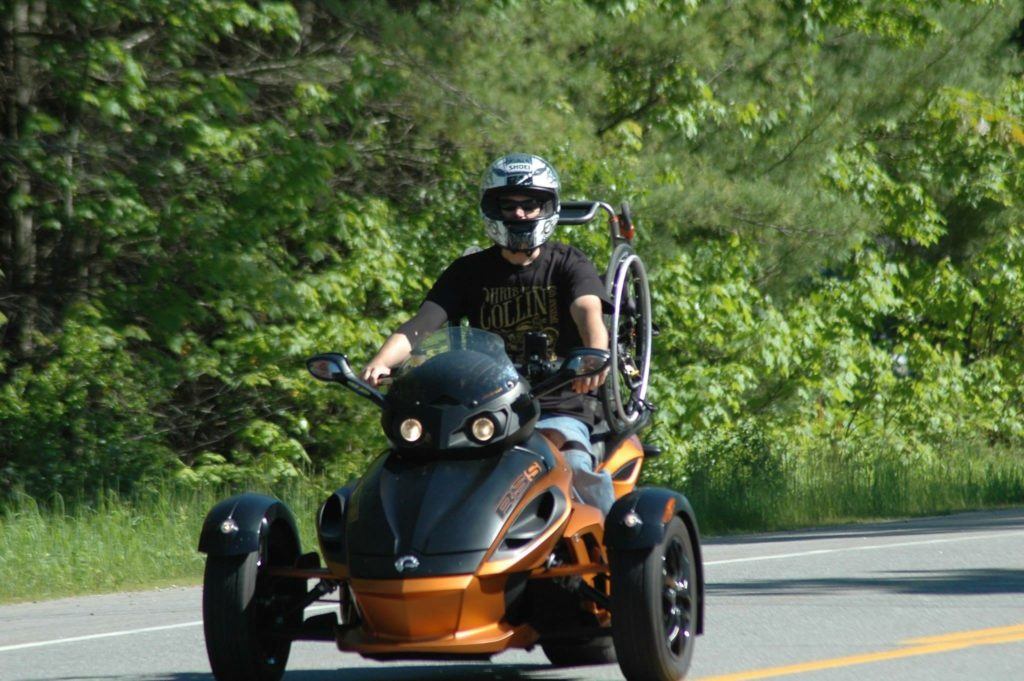
Chris Chats About Living Life
Many people ask me, “What’s life been like, since you were injured?” I don’t really consider myself as having a disability. I just live life in a different way than I did before my accident.
I’ve found a way to do anything I want to do, although I may have to take a different route to achieve those goals.
I realize the process to obtain my dreams will require me to travel a different path than people who aren’t in wheelchairs. However, I’m convinced I can arrive at the destination to obtain my goals and objectives by discovering and traveling that different path.
There’s nothing I can’t do.
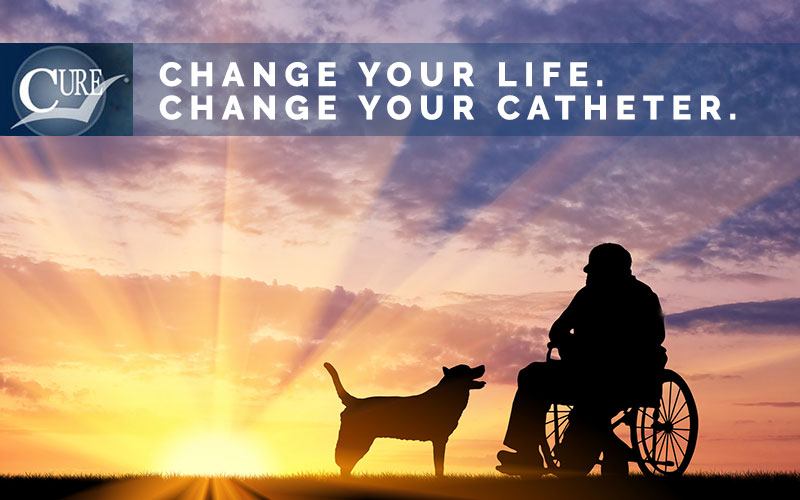
Enjoy Our Free Resources & Articles
 CURE NATION is designed with you in mind, to offer assistance and education when you need it through a personal support program.
CURE NATION is designed with you in mind, to offer assistance and education when you need it through a personal support program.
All of the information you find below and on our related social media pages is meant to guide you to places, topics and, resources that enhance your life, while also connecting you with a growing group of friends.
- Sign up for our free, CURE NATION e-newsletter to have our latest stories delivered directly to you, once a month.
- Get our FREE LIFESTYLE + TRAVEL BOOKS here.
- Have an idea you’d like to share? Let us know.
- Be sure to take a minute to meet our Cure Advocates too.

